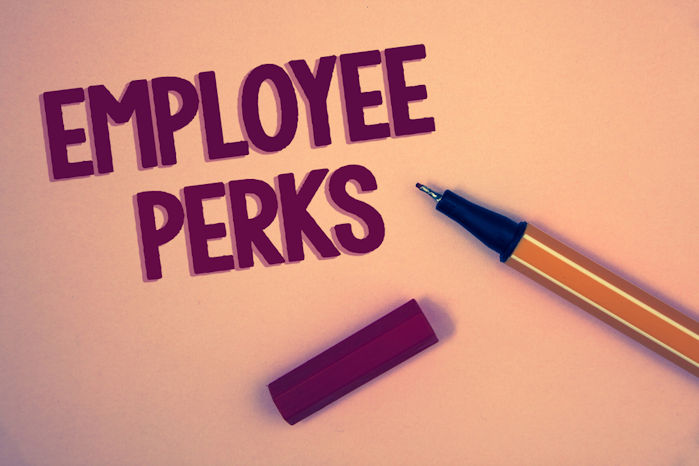The bottom line for employees or employers is no longer just about salaries and profits. The new bottom line is about people, mutual respect, and healthy lifestyles. A business that chooses its employee perks carefully is investing in its people and, thus, its future.
With careful thought, a company can offer perks tailored to the kind of people it wants to attract and retain. Here are the top 10 popular employer perks in 2020.
-
Financial Wellness Programs
According to PwC, 60% of people think that financial worries cause the most stress. Financial education is lacking, particularly among low-income individuals who often need it the most.
A financial wellness program helps people get out of debt, save, and prepare for retirement. With many people working from paycheck to paycheck, a business offering a financial wellness program can offer access to a better quality of life to its employees.
-
Paid leave
Offering paid time off makes for happier employees. It’s the opposite of working employees until they burn out and wringing out every ounce of sweat. Not only does paid time off make people feel valued, but it also allows them to maintain a healthy work-life balance and return to work feeling refreshed and recharged. Employees with free time will tend to be more creative, as “play” time is critical for stimulating creative ideas.
-
Commute and Transportation Assistance
According to Best Money Moves, more than 10 percent of employees quit due to commuting and travel issues, in addition to scheduling and flexibility issues. Commuting is stressful, so offering some incentive to help with transport costs is a good idea to support a workforce and keep it feeling positive by the time it arrives at work.
-
Flexible Work
Millennials and other younger workers in today’s workforce value the work-life balance over many other aspects of working life. Offering flexibility allows people to spend time with friends and families and participate in important activities that are meaningful to them and their communities.
Businesses are increasingly adopting or promoting flexible work opportunities, which typically mean flexible hours and the ability to work remotely. These arrangements can on a full-time or part-time basis.
-
Free Electronic Devices
Employees love free devices. From the business’ perspective, providing computers and smartphones ensures that people are using approved hardware and software. Connectivity should be the same from device to device, which is a bonus. Businesses that don’t offer devices for personal and business use at no cost, often subsidize their use.
-
Repayment of Student Loan Debt
Many young people in the US start work under the gun, in a position of financial worry. To help relieve some of this tension, employers offer student loan refinancing, or programs in which employees can exchange paid time off for payments towards decreasing student loan debt.
-
Mental Health Benefits
According to one study, about 25% of US employees have received a depression diagnosis at some point. Around 4 out of 10 of these individuals take about ten days off work per year. While distressing for the individuals, this also has a significant impact on business productivity.
Businesses can take positive action to spot and combat depression in the workplace, as well as offering ways to help their workers access mental health benefits. Taboo regarding depression has given way to understanding. Schemes aim to tackle the problem and help people live healthier, happier lives.
-
Work-Life Integration
Work-life integration refers to making workplaces better places to be. The divide between who we are at home and who we are “at the office” is disappearing with the help of fun environments, interactive break rooms, open offices with relaxed, comfortable seating, and areas where people can work and play together.
-
Food
Some businesses show their appreciation for their staff by making sure that good quality food and drink is available. People will go out of their way for their employers and do more than they are asked if they feel that the business is aligned with their values and that they are valued. On the other hand, a neglected workforce always has one eye on the clock and the other eye on the door.
-
Gym Membership
Working can be stressful. Where office work is concerned, it also has a tendency to be sedentary. This can be bad for a workforce’s health, which can lead to mental and emotional issues.
Subsidizing or offering a gym membership is a great way to counter potential health problems. Not only does it help keep a workforce fit, active, and more productive, but it also provides an opportunity for staff to socialize and bond over shared experiences.
Perks are not gimmicks to make one job or firm stand out from another. They demonstrate that people are valuable and offer better connections with other workers and with the business itself.
Candidates should be encouraged to look beyond salaries and consider corporate culture and other less tangible benefits. They should ask for perks and hold out for those perks that are most meaningful to them. Any business should consider its perks carefully to attract and retain the best people.


